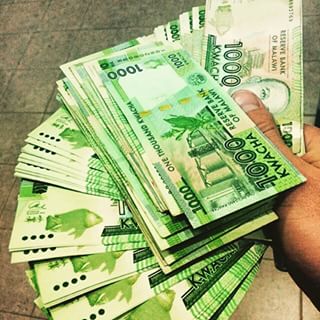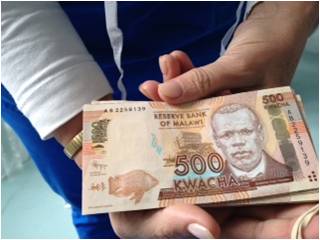![Malawi Kwacah continues to weaken]()
Malawi currency, the Kwacha continues its constant fall against the U.S. dollar and other major currencies now trading at MK568, MK868 and MK42 to US Dollar, UK Pound Sterling and South African Rand respectively as quoted by National Bank of Malawi (NBM).
[caption id="attachment_94212" align="alignright" width="320"]
![Malawi Kwacah continues to weaken]()
Malawi Kwacah continues to weaken[/caption]
[caption id="attachment_94213" align="alignright" width="320"]
![Kwacha slides further]()
Kwacha slides further[/caption]
The depreciation of the Kwacha is hurting importers, students studying with international examination bodies hard as they use more Kwachas to get foreign currencies than planned.
Many people are failing to buy forex from banks, a development that could be a result of the dealer banks hoarding forex in-order to suppress supply and induce continued depreciation for their profit making.
There is panic and uncertainty following the Kwacha continued weakening.
The Kwacha may slump another 25 percent by December, according to Standard Bank Group Ltd.
A
Bloomberg report on Tuesday indicated that Malawi kwacha is the world’s worst performer after the currencies of neighbouring Zambia and Kazakhstan this quarter, plunging 22 percent against the dollar.
““The situation is pretty dire because now’s the time the kwacha’s supposed to get a little bit stronger during the tobacco season,” said Hanns Spangenberg, a fixed-income analyst at NKC Independent Economists in Paarl, South Africa. “Malawi is in for a difficult fourth quarter.”
Reserve Bank of Malawi figures show that gross official reserves have dropped from $708.87 million or 3.39 months of import cover on August 14 2015 to $697.84 million or 3.34 months of import cover as of a fortnight ago.
On the other hand, private sector reserves also decline to $297.72 million or 1.42 months of import cover as of Friday last week from $312.64 million or 1.5 months of import cover on August 14 2015.
Centre For Social Concern (CFSC)’s Economic Governance and Justice Programme officer Mathias Kafunda has predicted tough time a head as prices of essential commodities will continue skyrocketing.
Kafunda attributed the Kwacha’s depreciation to the Malawi government move of selling debt to COMESA’s Preferential Trade Area (PTA) Bank in December, 2014 in order to increase the dollar base as the result the country was paying back the forex obtained from tobacco sale proceeds.
“It’s very unfortunate that the currency is sliding while tobacco proceeds are fetching highly. The problems lay on how such reserves are managed. We suspect that government isn’t honest enough to the public on how tobacco proceeds are managed.
“This has led to speculation that, the nation has started paying back debt gotten from PTA Bank end of last year (December, 2014) through the revenues collected from tobacco proceeds. The condition we are now could have been avoided if government listened to such move that would
hurt us hard.
“Nevertheless, government must come clearly to the people on the current economic turmoil and control the parallel market (BlackMarket) for forex which has been relaxed for some time now, otherwise the citizens will still feel the pitch of such economic huddles”, predicts Kafunda.
Analysts have been pressing the monetary authorities in recent weeks to consider pumping into the market a considerable amount of forex as one way of reducing pressure of demand for the foreign exchange and help slowdown the depreciation of the kwacha.

 Malawi Kwacah continues to weaken[/caption]
[caption id="attachment_94213" align="alignright" width="320"]
Malawi Kwacah continues to weaken[/caption]
[caption id="attachment_94213" align="alignright" width="320"] Kwacha slides further[/caption]
The depreciation of the Kwacha is hurting importers, students studying with international examination bodies hard as they use more Kwachas to get foreign currencies than planned.
Many people are failing to buy forex from banks, a development that could be a result of the dealer banks hoarding forex in-order to suppress supply and induce continued depreciation for their profit making.
There is panic and uncertainty following the Kwacha continued weakening.
The Kwacha may slump another 25 percent by December, according to Standard Bank Group Ltd.
A Bloomberg report on Tuesday indicated that Malawi kwacha is the world’s worst performer after the currencies of neighbouring Zambia and Kazakhstan this quarter, plunging 22 percent against the dollar.
““The situation is pretty dire because now’s the time the kwacha’s supposed to get a little bit stronger during the tobacco season,” said Hanns Spangenberg, a fixed-income analyst at NKC Independent Economists in Paarl, South Africa. “Malawi is in for a difficult fourth quarter.”
Reserve Bank of Malawi figures show that gross official reserves have dropped from $708.87 million or 3.39 months of import cover on August 14 2015 to $697.84 million or 3.34 months of import cover as of a fortnight ago.
On the other hand, private sector reserves also decline to $297.72 million or 1.42 months of import cover as of Friday last week from $312.64 million or 1.5 months of import cover on August 14 2015.
Centre For Social Concern (CFSC)’s Economic Governance and Justice Programme officer Mathias Kafunda has predicted tough time a head as prices of essential commodities will continue skyrocketing.
Kafunda attributed the Kwacha’s depreciation to the Malawi government move of selling debt to COMESA’s Preferential Trade Area (PTA) Bank in December, 2014 in order to increase the dollar base as the result the country was paying back the forex obtained from tobacco sale proceeds.
“It’s very unfortunate that the currency is sliding while tobacco proceeds are fetching highly. The problems lay on how such reserves are managed. We suspect that government isn’t honest enough to the public on how tobacco proceeds are managed.
“This has led to speculation that, the nation has started paying back debt gotten from PTA Bank end of last year (December, 2014) through the revenues collected from tobacco proceeds. The condition we are now could have been avoided if government listened to such move that would
hurt us hard.
“Nevertheless, government must come clearly to the people on the current economic turmoil and control the parallel market (BlackMarket) for forex which has been relaxed for some time now, otherwise the citizens will still feel the pitch of such economic huddles”, predicts Kafunda.
Analysts have been pressing the monetary authorities in recent weeks to consider pumping into the market a considerable amount of forex as one way of reducing pressure of demand for the foreign exchange and help slowdown the depreciation of the kwacha.
Kwacha slides further[/caption]
The depreciation of the Kwacha is hurting importers, students studying with international examination bodies hard as they use more Kwachas to get foreign currencies than planned.
Many people are failing to buy forex from banks, a development that could be a result of the dealer banks hoarding forex in-order to suppress supply and induce continued depreciation for their profit making.
There is panic and uncertainty following the Kwacha continued weakening.
The Kwacha may slump another 25 percent by December, according to Standard Bank Group Ltd.
A Bloomberg report on Tuesday indicated that Malawi kwacha is the world’s worst performer after the currencies of neighbouring Zambia and Kazakhstan this quarter, plunging 22 percent against the dollar.
““The situation is pretty dire because now’s the time the kwacha’s supposed to get a little bit stronger during the tobacco season,” said Hanns Spangenberg, a fixed-income analyst at NKC Independent Economists in Paarl, South Africa. “Malawi is in for a difficult fourth quarter.”
Reserve Bank of Malawi figures show that gross official reserves have dropped from $708.87 million or 3.39 months of import cover on August 14 2015 to $697.84 million or 3.34 months of import cover as of a fortnight ago.
On the other hand, private sector reserves also decline to $297.72 million or 1.42 months of import cover as of Friday last week from $312.64 million or 1.5 months of import cover on August 14 2015.
Centre For Social Concern (CFSC)’s Economic Governance and Justice Programme officer Mathias Kafunda has predicted tough time a head as prices of essential commodities will continue skyrocketing.
Kafunda attributed the Kwacha’s depreciation to the Malawi government move of selling debt to COMESA’s Preferential Trade Area (PTA) Bank in December, 2014 in order to increase the dollar base as the result the country was paying back the forex obtained from tobacco sale proceeds.
“It’s very unfortunate that the currency is sliding while tobacco proceeds are fetching highly. The problems lay on how such reserves are managed. We suspect that government isn’t honest enough to the public on how tobacco proceeds are managed.
“This has led to speculation that, the nation has started paying back debt gotten from PTA Bank end of last year (December, 2014) through the revenues collected from tobacco proceeds. The condition we are now could have been avoided if government listened to such move that would
hurt us hard.
“Nevertheless, government must come clearly to the people on the current economic turmoil and control the parallel market (BlackMarket) for forex which has been relaxed for some time now, otherwise the citizens will still feel the pitch of such economic huddles”, predicts Kafunda.
Analysts have been pressing the monetary authorities in recent weeks to consider pumping into the market a considerable amount of forex as one way of reducing pressure of demand for the foreign exchange and help slowdown the depreciation of the kwacha.